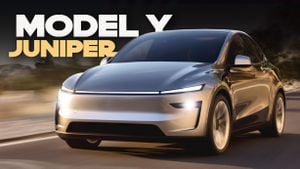Honda and Nissan are moving forward with discussions for a potential business merger, aiming to establish a new joint holding company by August next year. This initiative is noted as part of both companies’ strategy to strengthen their competitiveness, particularly against rising players in electric vehicles and next-generation automotive technology. Meanwhile, Mitsubishi Motors has confirmed its decision not to participate in this merger, maintaining its intentions to preserve its public listing and explore collaborations on specific projects with both automakers.
The two Japanese automakers announced their merger discussions late last year, with plans to create the holding company which would oversee operations. This strategic alignment is seen as pivotal, especially as competition intensifies globally. Analysts estimate the merger could eventually position the combined entity as the third largest automotive group worldwide, trailing only Toyota and Volkswagen after achieving more than 8 million annual vehicle sales.
On January 24, reports surfaced indicating Mitsubishi's withdrawal from the merger discussions, leading to significant fluctuations in its stock value. A drop of nearly 9% was noted, reflecting investor concern over Mitsubishi's prospects without the potential synergy offered by joining forces with Honda and Nissan. The company stated, "There is no fact of any decision being made," emphasizing their exploration of various options for future collaborations.
Mitsubishi's CEO Takao Kato elaborated on the company's position, stressing, "Nothing has been decided yet" and highlighting the need for adjustments based on diverse stakeholder opinions. The prevailing narrative suggests Mitsubishi aims to focus on enhancing its collaborative capabilities with Honda and Nissan without formally joining the merger. This reflects their intent to leverage existing partnerships for mutual benefit rather than risk becoming overshadowed within a larger corporate structure.
The complexity of this merger talks stems from the dynamics of power within the proposed holding company. Nissan, as Mitsubishi's largest shareholder, holds approximately 27% of its shares, raising concerns about Mitsubishi's input and influence if it were to participate fully. The financial disparity is also telling; with Mitsubishi's market capitalization standing at around $7 billion, it pales compared to Honda’s approximately $60 billion and Nissan’s $14 billion, making it difficult for Mitsubishi to assert its strategic interests effectively.
Past collaborations have been influenced by Mitsubishi’s struggles post-scandal of inflated fuel economy figures, which resulted in Nissan taking a controlling stake. Historically, the ties between these companies have been fraught with challenges, and the latest developments indicate Mitsubishi’s wariness about losing its autonomous decision-making capacity.
Honda and Nissan have indicated clear intentions to boost their competitive edge by pooling resources to fund the substantial investments required for next-generation vehicles, including software-defined vehicles (SDVs) and electric vehicles (EVs). The necessity for extensive research and development funding has emerged as both companies reassess their capacities to compete against fast-growing challengers, particularly from the U.S. and Chinese markets.
While Mitsubishi may not enter the merger, the expected partnership with Honda and Nissan on technical developments may allow it to participate on its terms, focusing on technology cooperation rather than corporate integration. "Even without joining the merger, there’s potential for cooperation on supply of products and technical sharing," noted analysts. This cooperative approach stands to serve Mitsubishi well as it navigates its recovery strategy.
The future of this merger remains to be fully outlined, as stakeholders are closely observing the strategic maneuvers of all three companies. The next significant milestone will arrive at the end of January, when Mitsubishi is expected to conclude its assessment on potential participation. Meanwhile, industry experts will continue to analyze how this merger, or lack thereof, will reshape Japan’s automotive sector.
This proposed merger signals shifting trends within the automotive industry as major players adapt to changing market conditions. With Honda and Nissan seemingly poised to deepen their collaboration, the impact on Mitsubishi’s market positioning and operational strategies could set the stage for significant developments across the sector.



